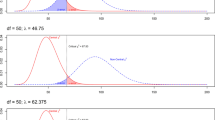Abstract
We compare the experimental results of three stag-hunt games. In contrast to Battalio et al. (Econometrica 69:749–764, 2001), our design keeps the riskiness ratio of the two strategies at a constant level as the optimization premium is increased. We define the riskiness ratio as the relative payoff range of the two strategies. We find that decreasing the riskiness ratio while keeping the optimization premium constant decreases sharply the frequency of the payoff-dominant equilibrium strategy. On the other hand an increase of the optimization premium with a constant riskiness ratio has no effect on the choice frequencies. Finally, we confirm the dynamic properties found by Battalio et al. that increasing the optimization premium favours best-response and sensitivity to the history of play.
Similar content being viewed by others
References
Anderlini L (1999) Communication, computability and common interest games. Games Econ Behav 27: 1–37
Battalio R, Samuelson L, Van Huyck J (2001) Optimization incentives and coordination failure in laboratory stag hunt games. Econometrica 69: 749–764
Berninghaus S, Ehrhart K (2001) Coordination and information: recent experimental evidence. Econ Lett 73: 345–351
Carlsson H, Van Damme E (1993) Global games and equilibrium selection. Econometrica 61: 989–1018
Cooper R, Dejong D, Forsythe D, Ross T (1992) Communication in coordination games. Q J Econ 107: 739–779
Feltovich N (2005) Critical values for the robust rank-order test. Commun Stat 34: 525–547
Fligner M, Policello G (1981) Robust rank procedures for the Behrens-Fisher problem. J Am Stat Assoc 76: 162–168
Friedman D (1996) Equilibrium in evolutionary games: Some experimental results. Econ J 106: 1–25
Fudenberg D, Levine DK (1995) Consistency and cautious fictitious play. J Econ Dynam Control 19: 1065–1089
Fudenberg D, Levine DK (1998) The theory of learning in games. The MIT Press, Cambridge
Harsanyi J, Selten R (1988) A general theory of equilibrium selection for games with complete information. M.I.T. Press, Cambridge
Harsanyi J, Selten R (1995) A new theory of equilibrium selection for games with complete information. Games Econ Behav 8: 91–122
McKelvey R, Palfrey T (1995) Quantal response equilibria for normal form games. Games Econ Behav 10: 6–38
Schmidt D, Shupp R, Walker J, Ostrom E (2003) Playing safe in coordination games: the roles of risk-dominance, payoff dominance and history of play. Games Econ Behav 42: 281–299
Straub P (1995) Risk dominance and coordination failures in static games. Q Rev Econ Fin 35: 339–363
Van Huyck J, Battalio R, Beil R (1990) Tacit coordination games, strategic uncertainty and coordination failure. Am Econ Rev 80: 234–248
Van Huyck J, Battalio R, Beil R (1991) Strategic uncertainty, equilibrium selection, and coordination failure in average opinion games. Q J Econ 106: 886–911
Author information
Authors and Affiliations
Corresponding author
Rights and permissions
About this article
Cite this article
Dubois, D., Willinger, M. & Van Nguyen, P. Optimization incentive and relative riskiness in experimental stag-hunt games. Int J Game Theory 41, 369–380 (2012). https://doi.org/10.1007/s00182-011-0290-x
Accepted:
Published:
Issue Date:
DOI: https://doi.org/10.1007/s00182-011-0290-x




